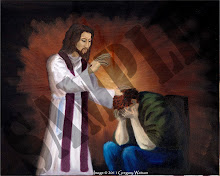One of the great paradoxes of Christianity is found in the fact that the closer we get to holiness and the more Christ-like we become, the more keenly aware we are of just how far short we fall of His glory. When we grow in piety and fear of the Lord, coming to receive His Real Presence in the Eucharist with due reverence, our own unworthiness comes into clear focus. This is accentuated just before Communion when we pray the words of the Roman Centurion in the Gospel: "Lord, I am not worthy that You should enter under my roof; but only say the word, and my soul shall be healed."
The First Sorrowful Mystery: Jesus' Agony in the Garden
For True Contrition for Sin
When we meditate upon Jesus praying in Gethsemani, taking upon Himself the burden of the sins of mankind, we are filled with compunction for our own sins, for our own part in His Crucifixion. If we are guilty of having committed any sins for which we have not received absolution, such compunction leads us to the Sacrament of Confession, where we once more are made new in His grace, as St. Paul writes, "For the sorrow that is according to God worketh penance, steadfast unto salvation" (2 Corinthians 7:10). But even when we are not currently in a state of sin, such compunction is nevertheless helpful in keeping us from sin, and leads us to a life of penance for our past sinfulness, and on behalf of the sins of others. For the deeper we enter into this mystery, and the more united with Christ we become, the more sorrowful for the sins of others we become. We are not satisfied with penance for our own sins, but for those of others, in order to make reparation for them and hopefully bring them to conversion, themselves.
Our deep sorrow, or contrition, for sin leads us to say with St. Paul, "[I] now rejoice in my sufferings for you, and fill up those things that are wanting of the sufferings of Christ, in my flesh, for his body, which is the church" (Colossians 1:24). So through our penances, we are able to make satisfaction for our own sins, and reparation for those of others, and through so doing, become even more united to Christ our saviour.
The Second Sorrowful Mystery: The Scourging at the Pillar
For the Virtue of Purity
St. Thomas Aquinas tells us that of the Seven Deadly Sins, the sins of the flesh, gluttony and lust, are the "least" deadly, as they are sins primarily affecting the body, as opposed to pride, envy, and the like, which pertain specifically to the soul. And yet, Our Lady, in her apparitions at Fatima, told the three shepherd children that more souls are lost through sins of the flesh, than through any other sins. They might not be inherently as damaging, but because they're so available and instantly gratifying, our physical senses and passions are much more easily drawn to them. Penance, the depriving ourselves of something good (such as in fasting), or the infliction of some small suffering (such as kneeling without the kneeler or putting a small stone in your shoe, on purpose), help us to discipline our passions, just as an athlete disciplines his body through regular exercise.
And so as we meditate on Jesus' scourging (that quintessential symbol of penance), we ask for the grace to remain pure in body and in mind, uniting our own small penances with His, so that His grace may further equip our souls for growth in holiness.
The Third Sorrowful Mystery: The Crowning with Thorns
For Moral Courage
When we live a life of moral purity, living the Gospel and showing our faith in word and in deed, we will face hostility from the world around us. Our lives of love and charity, grounded in the Truth, will be called hatred and fear, grounded in backward thinking and superstition. Jesus warned us that if the world persecuted Him, that we should expect no less for ourselves. Our life of penance will have the benefit of preparing us to suffer at the hands of others, but in the third sorrowful mystery, we also pray for courage and fortitude. These two terms are synonymous, but I personally make a distinction--courage is that inner strength to overcome fear and begin to do the right thing in the face of opposition or danger. Fortitude is applying that same strength to persevering in the right thing which we have undertaken.
Many times, we know what is right, but the world around us tries to make the situation to seem grey and muddy. Through their language and sophistries, and downright peer pressure and bullying, our culture tries to make what's right seem wrong, and what's wrong seem right. We are often intimidated into not doing good, or speaking out against evil. We need the gift of Courage to be able to stand up and prophetically proclaim the truth to our culture. And having done so, we need the Fortitude to maintain that position in the face of adversity.
Against what Pope Benedict XVI refers to as a "Dictatorship of Relativism", we need the conviction to stand up for the Truth, proclaiming it lovingly, but firmly.
The Fourth Sorrowful Mystery: Jesus Carrying His Cross
For the Virtue of Patience
On our journey through life, we will meet with much suffering. It seems that this is more true for those who strive to follow Christ in everything--which, I suppose, is to be expected, for as our first pope told us, "For unto this are you called: because Christ also suffered for us, leaving you an example that you should follow his steps" (1 Peter 2:21). This flies in the face, of course, of those who say either that serving Jesus will make us healthy and prosperous, or those who say that people only become religious because it makes them happy. Whether it be a result of standing up for the truth, or the natural course of life--sickness, job loss, betrayal, the death of loved ones, poverty, or a host of other problems--being a Christian not only doesn't safeguard against these things. Instead, it almost guarantees them!
Why is this? It goes back to the discussion of penance. St. Peter goes on to say, "Christ therefore having suffered in the flesh, be you also armed with the same thought: for he that hath suffered in the flesh, hath ceased from sins: That now he may live the rest of his time in the flesh , not after the desires of men, but according to the will of God" (1 Peter 4:1-2). Our suffering, if we let it, helps us to see what is really important--and it's not the passing pleasures of this world. When we are deprived of them, we more easily acknowledge our dependence upon God, and know that our true happiness lies in Him alone. When we've learned what we can do without, and what it's like to be without, we can more readily go without in order to serve God more completely.
And just like we can unite our penances to Christ's suffering for others, even those sufferings that come to us as a surprise, or as unwanted "blessings", can also be united to Christ's Passion. Remember that word, "Passion". It's related to "passive". Christ didn't save us so much by what He did, but by what He allowed others to do to Him. So also we can either become angry and embittered by the hardships of life, or we can allow them to purify us, and make us more holy. And that same purifying, penitential power behind our offered-up suffering can be of great spiritual benefit to others, as well.
The Fifth Sorrowful Mystery: Jesus' Crucifixion and Death
For Final Perseverance
In the sufferings and the trials of life, we can often be tempted to despair, to believe that there is no God, or that, if there is, He hates us or is punishing us for some reason. These thoughts are faith-destroying, as I have seen first-hand. Through the gift of fortitude we press on through the suffering. At other times, however, the goodness of life and the pleasures of this world can lead us away from God. We grow complacent and think we don't need Him. In all our trials and temptations, we must persevere. If we give up along the way, and abandon our faith for some reason, then we will not be saved. The heretical notion espoused by some Christians that once we are saved, we will always be saved no matter what we do, is ludicrous on the face of it. Time and again, Jesus warns us to keep faith until the end. As He says, "he that shall persevere to the end, he shall be saved" (Matthew 24:13 and elsewhere).
And so, as we meditate on Jesus' Crucifixion, in which He endured such enormous suffering for love of us, we ask for the grace of final perseverance in order to keep us from the presumption that we have already "made it", or that we can make it, on our own strength. We need to remember that our perseverance in faith is only ever the gift of God, and so in all humility and poverty of spirit, we beg Him to pour that grace out upon us.
The sorrowful mysteries remind us that life is not always easy. And as Christians we need to remember that God does not just take all our pain away. Rather, He uses it to make us strong in virtue and holiness, so that we have the fortitude to persevere. And as we press on to take hold of that for which Christ has taken hold of us, we continue to grow deeper in faith, hope, and love for Him, preparing us to finally enter into that Eternal Life with Him. And that is the focus of the Glorious Mysteries of the Rosary.
Saturday 25 August 2012
Subscribe to:
Post Comments (Atom)







No comments:
Post a Comment